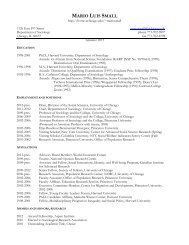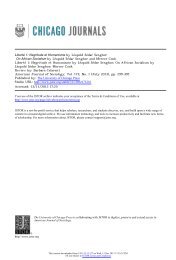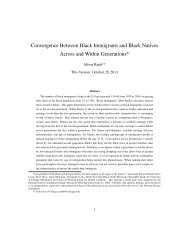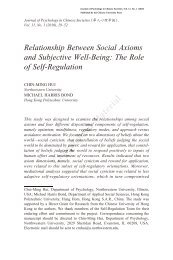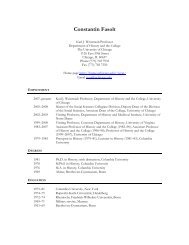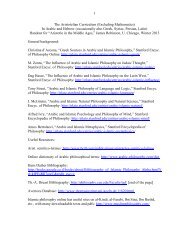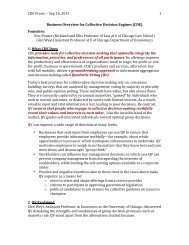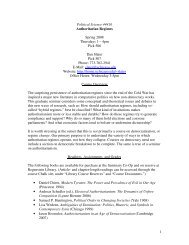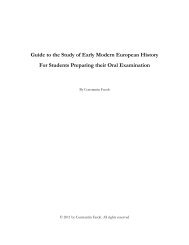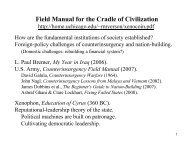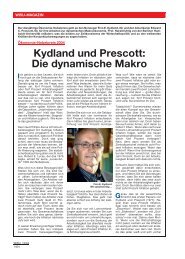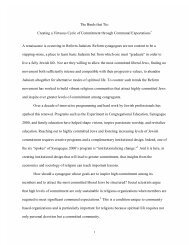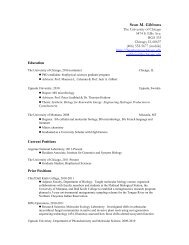Job Market Paper - Personal Web Pages - University of Chicago
Job Market Paper - Personal Web Pages - University of Chicago
Job Market Paper - Personal Web Pages - University of Chicago
Create successful ePaper yourself
Turn your PDF publications into a flip-book with our unique Google optimized e-Paper software.
Kim: Endogenous Choice <strong>of</strong> a Mediator<br />
how the other player’s belief about him and his belief about the other might change as a result<br />
<strong>of</strong> the unilateral veto. I link together a player’s decision to veto with rational expectations about<br />
the outcome in the continuation game, taking into account the appropriate individual rationality<br />
constraints.<br />
An (uninformed) alternative mediator proposes to implement an incentive compatible directrevelation<br />
mechanism γ : D × T → R. Participation constraints require that every type <strong>of</strong> every<br />
player to prefer to participate in γ than to play the status quo mechanism G δ with finite message<br />
space and outcome function. I assume that a status quo G δ depends on strategic actions and is<br />
identified with a mediator that players are initially involved with who implements an incentive<br />
compatible direct-revelation mechanism δ : D × T → R.<br />
For each i ∈ {1, 2}, let A i = {0} × R i , where 0 denotes going to war, and each set R i represents<br />
a nonempty finite set <strong>of</strong> possible reports r i as an informational input into G δ . I write R = R 1 × R 2<br />
and r = (r 1 , r 2 ). Then, G δ is a function <strong>of</strong> the form G δ : D × A 1 × A 2 → R such that<br />
G δ (d 0 |a 1 , a 2 ) = 1 if a 1 = 0 or a 2 = 0<br />
G δ (d|a 1 , a 2 ) = δ(d|r)<br />
otherwise.<br />
The strategies in the status quo mechanism G δ consist <strong>of</strong> the following: Each player reports<br />
(possibly deceptively) or chooses to go to war, given its type and its belief about the other player’s<br />
type. With prior beliefs, the equilibrium outcome in the status quo mechanism G δ is to hire<br />
mediator δ and both players honestly reporting their types. 24<br />
So, the participation constraints are considered by analyzing a two-stage ratification game. I<br />
want to establish whether there exists an equilibrium <strong>of</strong> vetoing strategies such that γ is unanimously<br />
ratified over G δ along every equilibrium path.<br />
An individual’s optimal vetoing strategy in this<br />
ratification game should depend on what he would believe about the other’s type and what the<br />
other would believe about his type, conditioned on the (unexpected) failure to ratify the alternative,<br />
and how he would expect the status quo to be played as a result <strong>of</strong> the veto.<br />
Thus, I shall need the following notations. I maintain the independence and symmetry assumptions<br />
on the probability <strong>of</strong> types. In the first stage, the players each vote simultaneously for or<br />
24 If one <strong>of</strong> the players rejects γ, then the inference drawn from the vote outcome alters both the vetoer and ratifier’s<br />
equilibrium plays in such a way that they play G δ (mediator δ appended to the war option) differently than with<br />
prior beliefs, since with updated beliefs, mediator δ may not be individually rational anymore, and the players may<br />
instead prefer to go to war. If either side chooses war, then the players get the war outcome. Therefore, individual<br />
rationality must embody the altered equilibrium play <strong>of</strong> G δ following unsuccessful ratification.<br />
26



